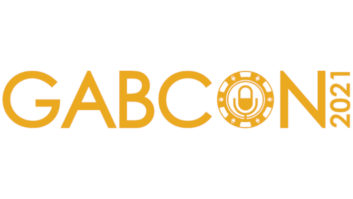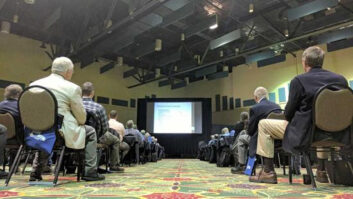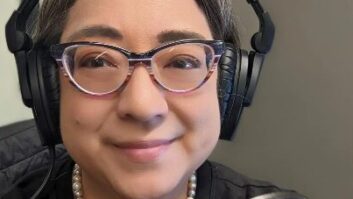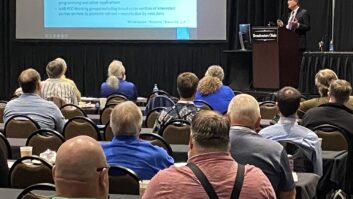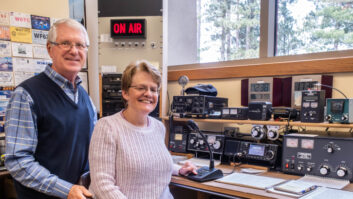From drones to #MeToo, the 2018 National Student Electronic Media Convention covered much ground during its recent gathering in Seattle.

For four days in October, student broadcasters met and mingled at College Broadcasters Inc.’s NSEMC. The annual event drew a near-record crowd of 416 attendees from 28 states, from Florida to Alaska. With sessions geared towards not only the radio crowd, but also television and web-oriented media outlets, the conference featured a mix of workshops, panels, station tours — KEXP(FM) and KOMO Radio and TV — a student media awards ceremony and even a film festival.

Half-day pre-convention workshops provided opportunities for participants to hone their skills in podcasting and audio storytelling through sound. Additionally, a full-day deep dive into MusicMaster allowed attendees to learn the ins and outs of that popular music scheduling software.
During the main three days of the conference, up to seven simultaneous sessions took place, making for a jam-packed schedule. The dizzying number of options included pragmatic primers (Slack, Adobe Audition, Gselector, etc.), deep dives into FCC rules and legal issues, marketing and social media tips, case studies on station success stories, as well as programming-oriented panels and more.
FUTURISTIC TECHNOLOGY — AS WELL AS THE CLASSICS
With sessions like “Introduction to Drones” and “Pick up the Slack in Your Organization” sharing tips and tricks for operating drones and using the hot communications tool Slack, the Seattle event touched on some of the newest tech and trends. Yet student presenters also lauded the use of old-school practices, like handmade paper ’zines.

During “Zines! A Brief History and Workshop,” representatives from KALX(FM), KUSF.org and WKNC(FM) gave an illuminating presentation on fan zine history, tracing links to science fiction culture in the 1930s and 1940s, to the punk music scene in the 1970s and 1980s, through to the 1990s riot grrrl movement. College radio stations have published ’zines for decades, and the panelists shared that it’s an easy and inexpensive way not only to promote one’s radio station but to express its unique identity.

Some specific tips from the panel included using online templates (to make construction of the ’zine easier), taking advantage of copyright-free images and hosting a ’zine-making party with your station. They also pointed out that a ’zine could even be made using just one sheet of paper that’s been folded into a small booklet.
FROM MENTAL HEALTH TO #METOO
Serious topics like mental health and sexual harassment were broached in packed sessions.
The Saturday morning session, “Supporting Female Broadcasters Through the #MeToo Movement,” was full of lively roundtable discussions. Those who woke up early for the chat shared personal experiences and strategized about how to make student media outlets safer spaces for women and people of color.

Similarly, “Managing Your Mental Health and Your Staff” delved into the importance of taking care of oneself and one’s staff, while attending college and working in broadcasting. Therapist Kelly Orchard and professor of psychiatry and behavioral sciences Dr. Patricia Areán offered wisdom to an overflowing room of conference goers.
Loyola University Maryland’s WLOY General Manager Tara Howell organized and hosted the mental health panel. “I decided to propose the session because it is something that is important to me, as well as something that I felt was missing from the discussion at CBI … In the past, management and how to step into management has been a topic for discussion and sessions, but not necessarily how it can take a toll on your mental health, as it did for me.
“The combination of stress in college, stress at work and my suffering mental health was not easy for me,” she said, “and I felt like now, as a grad student and as the general manager for WLOY for the third year, that I was in a place to reflect and share the lessons that I had learned the hard way in the hopes that someone else didn’t have to.”
As to why this conversation is so important at a student media event, Howell said, “College seems to be the time where people are the busiest, but also running their bodies and selves to the ground. It’s an incredible period of growth and learning, but also incredibly draining. You can’t be your best or get the most of your experience if you are burnt out. It is also incredibly important to teach the skills and emotional intelligence to take mental health and wellbeing seriously now, instead of later.”
THE POWER OF GRASSROOTS ORGANIZING
“It’s a story about saving something that you love,” proclaimed Joey Cohn, president and general manager of KNKX(FM) during an inspiring session on “The KNKX Miracle — How Community Support Saved a Station.”
When KPLU(FM)’s license holder, Pacific Lutheran University in Tacoma, Wash., announced its intention to sell the FM channel to University of Washington’s competing public radio station KUOW(FM), fans of the long-time music and regional news station KPLU fought back. The community galvanized, forming a nonprofit and raising $7 million in four months to match the existing offer for the license. Ultimately successful in their efforts, the former KPLU has carried on with its long-standing programming with new call letters KNKX, while being run by an independent nonprofit.

A truly grassroots effort, the station averted a takeover by KUOW largely because of broad listener support. Community meetings were held across western Washington and fans organized more than 100 fundraising events in the Puget Sound region. More than 24,000 donations came in, ranging from 43 cents to $250,000. Defying most fundraising wisdom, the new nonprofit brought in millions of dollars comprising mostly small donations from individuals.
Lessons learned from this endeavor are applicable to all radio stations, even if there is no impending crisis. Matt Martinez, KNKX director of content, suggested that all stations accept help from fans when help is offered. He also said that it’s important to “invite the community in,” and remarked that as KNKX plans for its new studio, it wants to have a “very public space,” where the station can interact with its listeners.
“Our work is super important to people,” KNKX Director of Development Mary Dunaway relayed, adding that supporters “stretched themselves” to give more than ever before to save the station’s local newsroom and jazz programming. She reiterated that “people care about your work.”
THE MURKINESS OF INDECENCY
At the start of “FCC Regulation of Indecency, Obscenity and Profanity: From Pacifica to Colbert,” attorney Daniel Kirkpatrick posted a warning that the session would contain “offensive language and offensive government policies.” The dry humor extended throughout the discussion of how FCC-licensed stations navigate policies about obscenity and indecency.
Walking the audience through numerous Federal Communications Commission decisions, Kirkpatrick pointed out some confounding inconsistencies on what has been judged to be indecent over the years. Looking ahead, he pointed out that in the current political landscape, it’s likely that news reporting will touch on “controversial matters” and that the “partisan atmosphere” could lead to more content-related complaints being filed with the FCC.
Kirkpatrick said that indecency regulations typically are clarified based on specific cases, so guidance on what is appropriate for stations to air is ever-changing.
SWAG SWAPPING

The annual Swag Swap Social was the place to be on Thursday night. As stations arranged piles of promotional items on tables throughout the room, participants roamed about, stuffing as many stickers, magnets, T-shirts, drink koozies, sunglasses, keychains, cups and chip clips into their tote bags and backpacks.
The camaraderie of mingling and trading advice with one’s peers was a vital part of CBI’s Seattle gathering.
“I enjoyed the opportunity to network and converse with people from across the nation about our shared interests,” reported CBI’s Student Representative Ave Martin, a junior at Colorado State University.

Reflecting on the convention, CBI Development Director and WSOU(FM) General Manager Mark Maben said that his students are putting what they learned in Seattle into action.
“I was inspired by how much my own students got out of the convention this year,” Maben said. “So many of them came back motivated to be better at what they do … This is what you want to see, students taking what they learned and using it back home. In addition to that, it’s always inspiring to me to see how easily our attendees get along with one another. A shared passion does build community.”
Planning is underway for CBI’s next convention in St. Louis, Mo., Oct. 30 to Nov. 2, 2019. Baltimore is in the books for October 2020.






